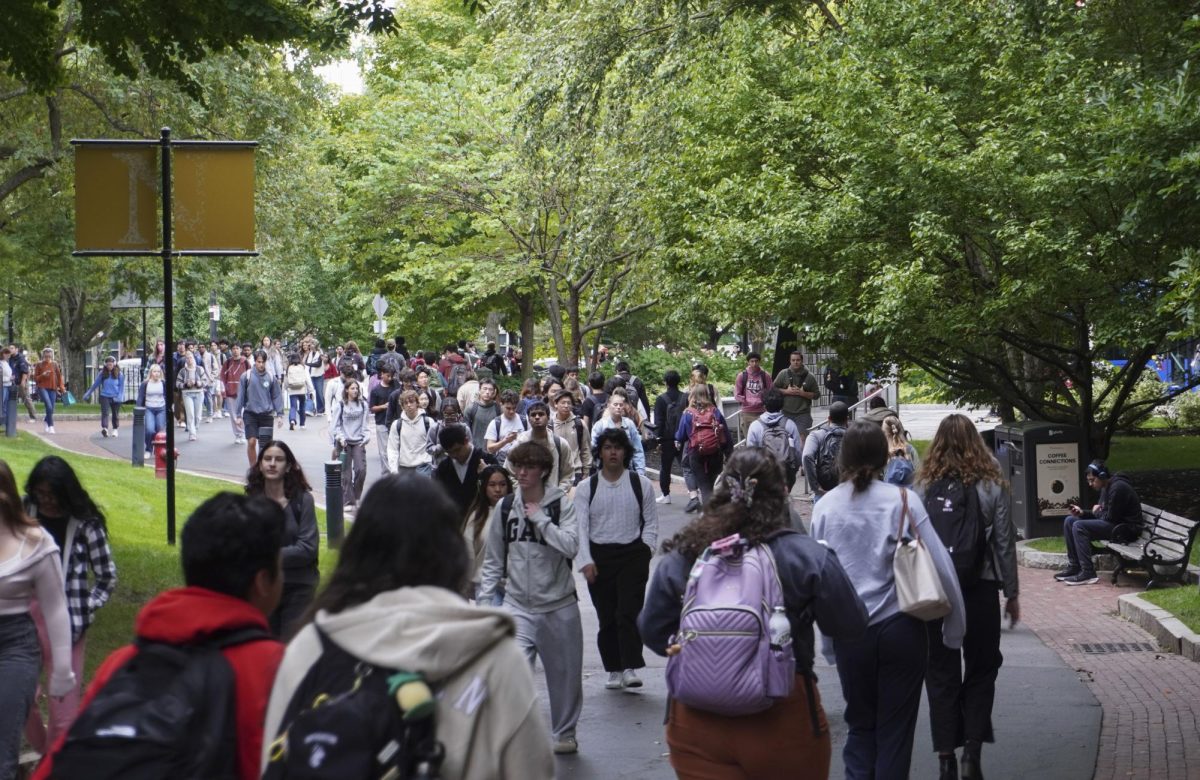Before Shadow, a Boston-based rapper, leaves his Jamaica Plain apartment, he arms himself. But unlike some mainstream rappers, he does not wield weapons. He tries to fortify his life through prayer.
Shadow, also known as Black Swan, is an independent artist, but he doesn’t use MySpace to promote his career like some others. Shadow, whose real name is Robert Thomas, is a “grinder,” a rapper who sells goods on a person-to-person basis in heavily-traveled areas. Every day, he scours the streets and the subway stations, selling music that laments gang violence and decries disrespect toward women.
“I’m a true believer that we are going through some hard times,” Shadow said. “When people celebrate death, it only attracts death. The adversary wants us to lose sight of the beauty of our women. The adversary wants us to lose site of our goals and dreams.”
Shadow, 32, did not always think this way, about spirituality and “the adversary.” But, he said he has learned from his trials and tribulations – at one point, he was homeless.
Shadow reformed, departing from a stage of life in which he lusted for sex instead of love, idolized the rap music of Easy E and the Notorious B.I.G., and walked around his high school with “a negative attitude,” he said.
After 10 years of unfulfilled dreams, Shadow found God – and music producers. In the winter of 2003, his first album, A Bitter Toast to My Inner Most, was produced with the help of students and graduates from the Berklee College of Music.
Since then, Shadow said he has sold more than 86,000 copies to commuters and pedestrians alike.
“Most people here have seen me,” he said. “But I know there are some people out there who are seeking my message.”
On Friday evening, Shadow entered Ruggles Station with his business material in a small side bag: 30 CDs of A Bitter Toast in multi-colored jewel cases along with a portable CD player and headphones. He hopped on the inbound train. Shadow approached riders, many of whom he had met before, and offered his music.
The album costs $5. When riders decline, which they usually do, Shadow replies “maybe I’ll catch you at a better time. I’ll see you again, I work that hard.” Or, he simply says, “Have a blessed day.”
When there are no more potential buyers, he waits for the next stop and scuttles into the car ahead. At the end of a track, he turns around, continuing this cycle for nearly five hours.
For those who are interested, he syncs the CD player to his, “Rain.”
“It’s an interesting marketing strategy, but I say ‘no thanks,'” said James Keenan, a senior communication studies major, after sampling the music. “Usually, I’m inclined not to talk to people that come to me out of the blue.”
But some college students on the train liked his method.
“I already have his album,” said John McGillin, a freshman industrial design major at the Wentworth Institute of Technology, who said he first met Shadow a month ago during an encounter in front of his residence hall. “I respect what he does. I used to be a door-to-door art salesman this summer. I understand how hard this type of job can be.”
Around 6 p.m., a worker on the train traveling back toward Ruggles Station popped out from his booth and half-hugged Shadow.
“Boston needs something positive. Boston needs the Shadow man,” said Martin Wilson, an MBTA employee. “The best thing about him is he’s approachable. If he gets famous, he’ll still be approachable.”
Shadow said he is the only grinder allowed to solicit on the T because the workers there have his album and appreciate his politeness.
Some riders, however, react harshly, or avoid eye contact when Shadow approaches them. Such cagey reactions cause Shadow to feel like he’s “just some panhandler,” he said, evoking his past feelings.
“It makes me think about when I was homeless for a year in 2002,” Shadow said in a deep, raspy voice. “This is what I’d do. I’d ride the trains just to stay warm. Everyone knew I was nice. I realized I was loving others more than I loved myself.”
Now, Shadow said, he’s developed a personal relationship with God and wants to stop his younger “brothers and sisters” from making the same mistakes. At 7 p.m., Shadow encountered a portly heroin addict named Dino. Dino was thrown out of his substance abuse rehabilitation clinic for using, Shadow said.
“Hey, big brother, I’m Shadow,” he said. “Have you heard my music?”
“I’m having a horrible day, man,” Dino said. “What can you do for me, man?”
Shadow handed Dino a free CD, and, in an attempt to encourage him, rapped a free-style version of the title song from his forthcoming album, Ghetto Polaroid.
Shadow said he believes the popular music industry is a manifestation of Satan.
“The adversary is the great duplicator,” Shadow said. “He takes God’s greatest gifts and basically bootlegs them to corrupt people.”
Ghetto Polaroid will be released Dec. 14 in conjunction with a performance at MassArt for GBOS entertainment’s “Boston’s Best Talent Holiday Special,” beginning at 8 p.m. In January, Shadow will embark on a six city New England tour. For more information contact Shadow at










